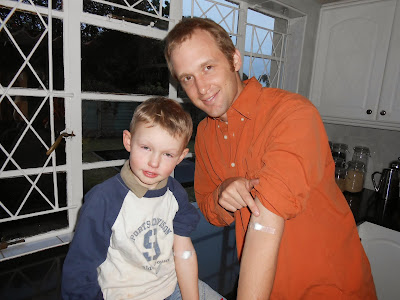As I sat by our housekeepers’ hospital bed last weekend, watching
her writhing in pain as tears rolled from her swollen eyes, my head spun. I’d like to present myself as the brave hero
that was nothing but confident that everything would be fine, but that would be
entirely untrue. Thoughts of handling a
Shona funeral, Ziwone’s baby, and what I’d tell her husband crept into my
mind. And hospital bills…
I had refused to do it.
I just could not drop her off at P.N., the federally run hospital downtown used by gardeners and housekeepers all over the city. The hospital is notorious for its day-long waiting lines full of corpses and all body fluids.
When I thought about our gardener’s uncle, who died in that very waiting line just
a few short months ago, I turned the car and took Ziwone to a private hospital.
It was more expensive for sure, but she was in bed hooked up to an I.V. within
ten minutes. And thank goodness she
was. It was typhoid.
Our first contact with typhoid fever has led to an exhausting
week of medical tests for everyone on our property, clinics and hospital visits,
and water samples. Our high-elevation city
of Harare has an amazing track record when it comes to malaria. But it is known
for its outbreaks of typhoid, a serious, life-threatening disease still present in the Third World.
The city’s water supply is often compromised with the bacteria, causing
epidemic rampages among lower socio-economic citizens who use the water supply
as their only available source of water.
Boreholes (sort of like private wells) on properties
throughout the city are sworn to be safe.
But occasionally septic seepage can infect a borehole or, in some cases,
an entire neighborhood. When a person
tests positive for typhoid, the city sends an investigator to test the water,
as it is serious business. Though we did
have an investigator come quickly, he took samples from our hot water geyser
when we had no electricity to run our borehole pump. Therefore the accuracy of his test is
anything but reliable, so we await a private company’s results.
Typhoid can be spread a number of ways. Though it is a salmonella bacteria most often
transported in water, it can be found on fresh produce washed with infected
water, communicable through bodily fluids, and occasionally carried by an
insect that has recently landed on infected feces. It is a good reminder, if nothing else, to
keep our guard up despite our comfort in the Third World.
Now to go buy some more bottled water…
